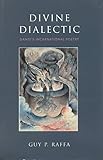Divine Dialectic : Dante's Incarnational Poetry / Guy P. Raffa.
Material type: TextSeries: Toronto Italian StudiesPublisher: Toronto : University of Toronto Press, [2000]Copyright date: ©2000Description: 1 online resource (272 p.)Content type:
TextSeries: Toronto Italian StudiesPublisher: Toronto : University of Toronto Press, [2000]Copyright date: ©2000Description: 1 online resource (272 p.)Content type: - 9780802048561
- 9781442673984
- 851/.1 21
- PQ4390 .R26 2000
- online - DeGruyter
| Item type | Current library | Call number | URL | Status | Notes | Barcode | |
|---|---|---|---|---|---|---|---|
 eBook
eBook
|
Biblioteca "Angelicum" Pont. Univ. S.Tommaso d'Aquino Nuvola online | online - DeGruyter (Browse shelf(Opens below)) | Online access | Not for loan (Accesso limitato) | Accesso per gli utenti autorizzati / Access for authorized users | (dgr)9781442673984 |
Browsing Biblioteca "Angelicum" Pont. Univ. S.Tommaso d'Aquino shelves, Shelving location: Nuvola online Close shelf browser (Hides shelf browser)
restricted access online access with authorization star
http://purl.org/coar/access_right/c_16ec
In this book, Guy Raffa offers a fresh reading of Dante's major literary works - the Divine Comedy and the Vita nuova - that combines central tenets of incarnational theology and dialectical thought to illuminate the poet's renowned ability to 'have it both ways' on issues that conventionally elicit an 'either/or' response. Viewing Dante as a poet of revision, not conversion, Raffa challenges a dominant paradigm in Dante criticism and takes full account of the poet's unconventional approach to such conventional dichotomies as eros and spirituality, fame and humility, action and contemplation, and obedience and transgression. Divine Dialectic ultimately argues that Dante crosses textual and theological boundaries in his medieval epic to promote the paradoxical union of contradiction and resolution as a way of reading his poem and, by extension, the world itself.
Mode of access: Internet via World Wide Web.
In English.
Description based on online resource; title from PDF title page (publisher's Web site, viewed 01. Nov 2023)









